War Victims' Voices on Transitional Justice
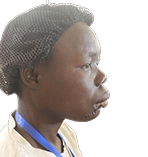
12 Years in captivity
I was abducted from my village at the age of 14 by the LRA soldiers. I spent 12 years in the bush with the LRA after which I escaped and I had had three children. On return to find all the seven family members had been murdered. I returned with sustained wound of gun shot in the mouth, and all I was told is I needed a reconstructive surgery. For years, and struggling without money, I have unsuccessfully approached thirteen (13) agencies for medical assistance.
I have searched for assistance from many people and I felt I was burdening many people, and even my own uncle (father’s brother) have grabbed our land. I am grateful to AYINET for reaching and providing me medical assistance this year and above all inviting me to participate in the war victims’ conference on transitional justice.
For long, victims of war have been taken as materials of exhibition. People take our stories and tell wherever and whatever they want. We are very happy today that for the first time, we victims are coming together in this conference to discuss about justice. This is our chance, and we are happy to be given a chance, space and a forum to speak out and tell our own stories.
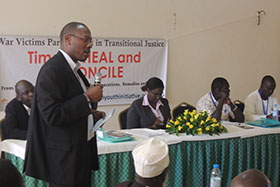
"For some issues, we cant wait for the TJ policy to come into place. Like on land, there is an act which provides that you have 12 years within which to recover your land. Let us use other laws in place, for some of these issues, there are organisations that offer legal aid..." Mr. Joseph Manoba Akwenyo
@AYINET Tweet
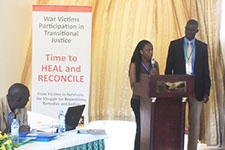
Angela Nagagga from Trust Africa, speaking at the victims' conference in Lira. "Trust Africa has keen interest in supporting more meaningful victims participation in Transitional Justice processes."
@AYINET Tweet

"This is the first time I have been in a conference where war victims are involved in a discussion on Transitional Justice" Akello Mary from Amuria - Tesor
@AYINET Tweet
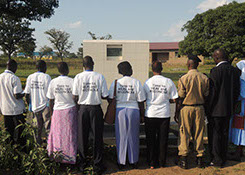
With memory comes healing. Participants in the war victims conference visited and paid respect to the hundreds that were massacred at Barlonyo and Abia, Lira
@AYINET Tweet

“People say we don’t want to participate, but victims are tired of giving their views without feedback. Everybody thinks the best for the war affected and former child solider is vocational education, train to be a tailor; but we want to be in the office and be driven; meaning victims too needs formal and better education. Susan Acan, Empowering Hands, Gulu
@AYINET Tweet
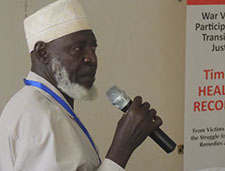
"The steps taken today to bring victims for the first conference is the beginning of justice itself. Victims need protection as they participate." Hajji Longa Sebbi (Moyo war victims’ Association).
@AYINET Tweet
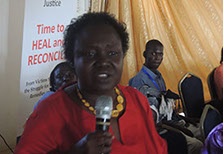
" My son was abducted on his way to school and he has never returned. I can hear the same complaints coming from West Nile, Acholi , Lango and Teso. can some one account for the missing people?" Fatum Norah
@AYINET Tweet
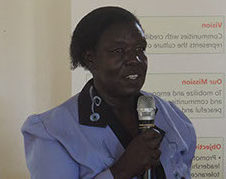
"Women need to be involved in active participation and not mere observation". Margaret . Women Initiative for Gender Justice
@AYINET Tweet
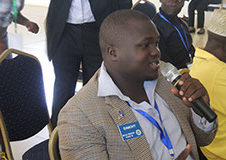
"Victims properties especially land should be protected." Thomas Lapyem, Center For Reparation and Reconciliation
@AYINET Tweet
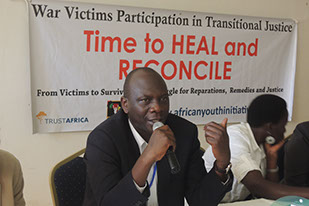
The voices and demands of the victim, are what informs the TJ process, Victims should be provided various avenues of participation Michael Otim ICTJ Uganda
@AYINET Tweet
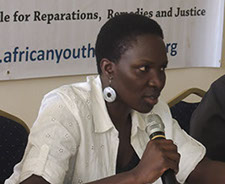
"Effective participation comes with community outreach which enables everyones participation. Recognition alone is not enough but policies that make reparations possible, taking into account the gender and regional variations" Teddy Atim Feinstein International Center (FIC)
@AYINET Tweet
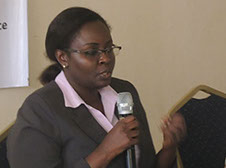
"Government has a duty to protect its citizens, victims have waited for too long and government should provide interlim relief to victims." Sarah Kasande ICTJ Uganda
@AYINET Tweet
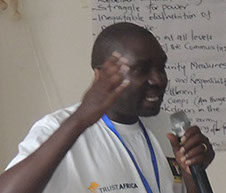
"The success of Transitional Justice will come from victims understanding and participation" Chris Ongom, Coordinator Uganda Victims Foundation
@AYINET Tweet
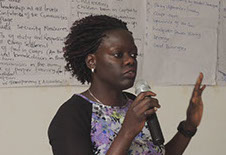
"You do not have to be a direct victim in order to bring change, but must know we all have space for solidarity with victims.? Judith Christabella Acheng. Advocate for Public International Law Uganda
@AYINET Tweet
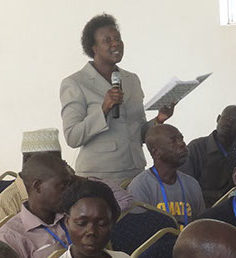
“To stakeholders, as government has come up with Transitional Justice Policy, it’s now upon the civil society organizations and the government to work together and sensitize affected communities about transitional justice processes” “to the victims and the affected communities, I want to assure you that the government is in the final stages of developing the transitional justice policy.
I understand it’s not easy to continue being patient when you are a patient and in pains. But, the government needs your participations to ensure the success of transitional justice processes. And I take the opportunity to assure you that the government is developing the witness protection bill to ensure you freely participate in the transitional justice processes. Jane Francis Adongo – Uganda Law Reform Commission (ULRC)@AYINET Tweet
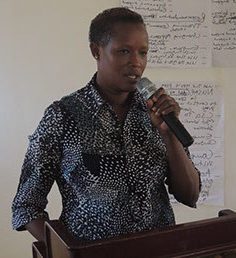
"As we gather for this conference, may we realise that we are all victims in one way or another. The government is finalising the transitional justice policy and there is need to sesnitise the people about the processes. By being here, we’ve learnt a lot from the victims. as i can hear from you, victims are ready to participate in TJ processes, but they lack coordination. As government and civil society organisations, we need to work together and sensitise the population. Leadership at all levels must be engaged more with victims in order to better understand and respond to their needs. Lets avoid pointing fingers but collaborate to the national peace". Ssekindi Aisha, Deputy Resident District Commissioner, Lira District
@AYINET Tweet


